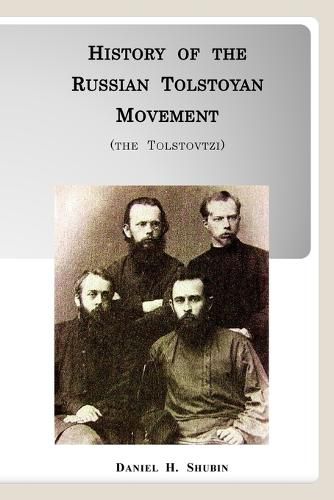Readings Newsletter
Become a Readings Member to make your shopping experience even easier.
Sign in or sign up for free!
You’re not far away from qualifying for FREE standard shipping within Australia
You’ve qualified for FREE standard shipping within Australia
The cart is loading…






This title is printed to order. This book may have been self-published. If so, we cannot guarantee the quality of the content. In the main most books will have gone through the editing process however some may not. We therefore suggest that you be aware of this before ordering this book. If in doubt check either the author or publisher’s details as we are unable to accept any returns unless they are faulty. Please contact us if you have any questions.
Leo Tolstoy died 1910, at the Astapova train station of pneumonia. Then what? Did Tolstoy's influence suddenly terminate with his death? Did those who dedicated themselves to his interpretation of Jesus Christ's teaching abandon it and return to their secular lives and beliefs? They called themselves Tolstovtzi: disciples of Tolstoyan philosophy. They continued the belief in Christian pacifism: the refusal of war and military service and violence in any form. The retained their high morality based on the Gospels, their vegetarian diet, and resided in communities they formed where all material items were held in common. This is their story. They held to their convictions even to their death by firing squad, or suffering in jails and prisons, or exile to concentration camps. To survive some were willing to relocate their commune to Siberia to distance themselves from Soviet government interference. Included in the volume is a brief biography of Leo Tolstoy, an exposition of his religious philosophy, and a description of Russia at the time of Tolstoy. Daniel H. Shubin has written several books on the life and philosophy of Leo Tolstoy, as well as translated War and Peace, The Kingdom of God is within You, Confession, What I Believe, A Path for Life, Summary of the Gospels, and On Life, from Russian into English. He has also visited the Tolstoy estate in Tule, and travelled Russia.
$9.00 standard shipping within Australia
FREE standard shipping within Australia for orders over $100.00
Express & International shipping calculated at checkout
This title is printed to order. This book may have been self-published. If so, we cannot guarantee the quality of the content. In the main most books will have gone through the editing process however some may not. We therefore suggest that you be aware of this before ordering this book. If in doubt check either the author or publisher’s details as we are unable to accept any returns unless they are faulty. Please contact us if you have any questions.
Leo Tolstoy died 1910, at the Astapova train station of pneumonia. Then what? Did Tolstoy's influence suddenly terminate with his death? Did those who dedicated themselves to his interpretation of Jesus Christ's teaching abandon it and return to their secular lives and beliefs? They called themselves Tolstovtzi: disciples of Tolstoyan philosophy. They continued the belief in Christian pacifism: the refusal of war and military service and violence in any form. The retained their high morality based on the Gospels, their vegetarian diet, and resided in communities they formed where all material items were held in common. This is their story. They held to their convictions even to their death by firing squad, or suffering in jails and prisons, or exile to concentration camps. To survive some were willing to relocate their commune to Siberia to distance themselves from Soviet government interference. Included in the volume is a brief biography of Leo Tolstoy, an exposition of his religious philosophy, and a description of Russia at the time of Tolstoy. Daniel H. Shubin has written several books on the life and philosophy of Leo Tolstoy, as well as translated War and Peace, The Kingdom of God is within You, Confession, What I Believe, A Path for Life, Summary of the Gospels, and On Life, from Russian into English. He has also visited the Tolstoy estate in Tule, and travelled Russia.